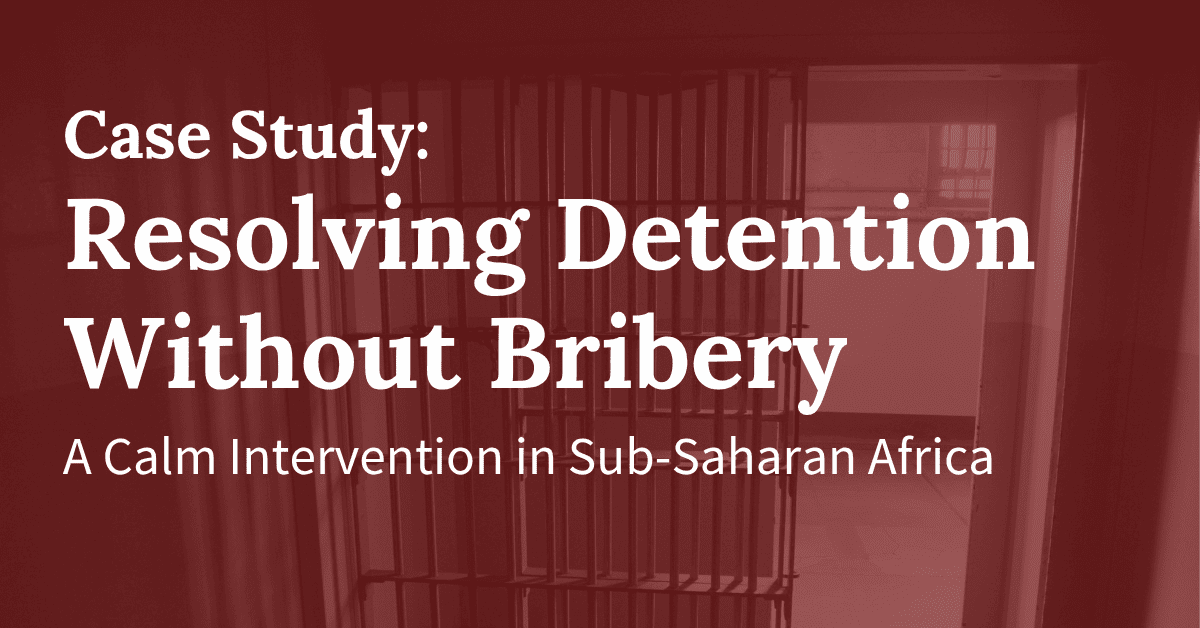
On what should have been a routine compliance review, a trusted contractor was suddenly taken into custody by local authorities. The cause: a clerical error in travel documents that were out of date by less than 72 hours. What followed wasn't just a test of legal process, but a test of values. In regions where "facilitation payments" are often treated as standard operating procedure, the pressure to resolve problems quickly can eclipse the commitment to resolve them correctly.
The client faced a choice: escalate through diplomatic channels and risk drawing unwanted attention, quietly pay to make the problem disappear, or find a third path that protected both their contractor and their principles. With no clear playbook and a narrow window to act, they turned to Pholus. What unfolded over the next 12 hours became a case study in how to navigate high-pressure situations without compromising integrity or leaving people behind.
This case study is relevant if you're facing:
A team member or contractor has been detained, arrested, or held by local authorities in a foreign jurisdiction, and you're navigating unclear legal processes, inconsistent timelines, or conflicting information about what's required for release. You need someone on the ground who understands both the formal procedures and the informal realities.
Pressure to resolve operational problems through informal payments, facilitation fees, or other ethically compromising shortcuts that conflict with your organizational values and compliance standards. You're being told "this is how things work here," but you need a path forward that protects your principles without abandoning your people.
Regulatory or compliance issues in markets where the gap between official procedure and actual practice creates confusion, risk, or vulnerability for your staff. The rules exist on paper, but enforcement is inconsistent, interpretations vary by official, and you're unsure how to navigate without creating additional exposure.
The need for immediate on-ground representation in a high-pressure situation where your team lacks local expertise, language fluency, cultural context, or established relationships with authorities. You need someone who can show up physically, communicate effectively, and represent your interests without escalating tensions.
Operating in environments where missteps can trigger reputational damage, donor scrutiny, partner concern, or regulatory attention far beyond the original incident. You need resolution that protects both people and principles while managing the risk of cascading consequences that outlast the immediate crisis.
We deployed a rapid-response consultant with prior experience in the region. Our mission was clear: secure the contractor's release the same day, without issuing bribes, igniting backlash, or making the client look weak or disorganized to local authorities or upstream stakeholders.
We established a ground presence within hours, arriving at the precinct dressed respectfully and signaling that the contractor was not alone or forgotten. Our presence immediately shifted the narrative from a bureaucratic technicality involving a local worker to a situation involving international scrutiny and organizational backing. We didn't posture or threaten. We simply showed up, calmly, consistently, and with documents in hand that demonstrated preparation and seriousness.
Working alongside the contractor and local counsel, we reviewed the specific documentation error that had triggered the detention and clarified that while the contractor had made an oversight, it was neither malicious nor materially noncompliant. We translated the relevant policy provisions and regulations into the local administrative vernacular, highlighting that a corrected form had already been submitted digitally but had not yet been processed. This reframed the situation from intentional violation to administrative timing issue.
We coordinated with the client's in-house legal team in real time to ensure that every message delivered on the ground matched the client's broader compliance framework and risk tolerance. This prevented conflicting instructions, allowed the client to maintain its public and internal position that problems are resolved through lawful means, and ensured no one was operating without clear authority or alignment on next steps.
When the moment came for negotiation, we made no offers of payment but extended clarity: the contractor would be made available for a full compliance review the following day at the agency's office with a revised documentation package. In return, we requested that he be released the same evening so that he could rest, rehydrate, and appear fully composed for the review. No bribes were paid. No favors were exchanged. But dignity was preserved on all sides, and the agency avoided appearing publicly outmaneuvered or disrespected in front of international observers.
This case study includes the complete four-part intervention strategy we deployed on the ground, how we established physical presence at the precinct to shift the narrative without posturing or threats, and the exact coordination process we used with in-house legal counsel to ensure every on-ground message matched the client's broader compliance framework.
If your team is operating in a high-risk jurisdiction and you're concerned about detention, regulatory pressure, or situations where informal payments are expected, we can help. Pholus specializes in ethical crisis response in environments where the usual playbooks don't work.